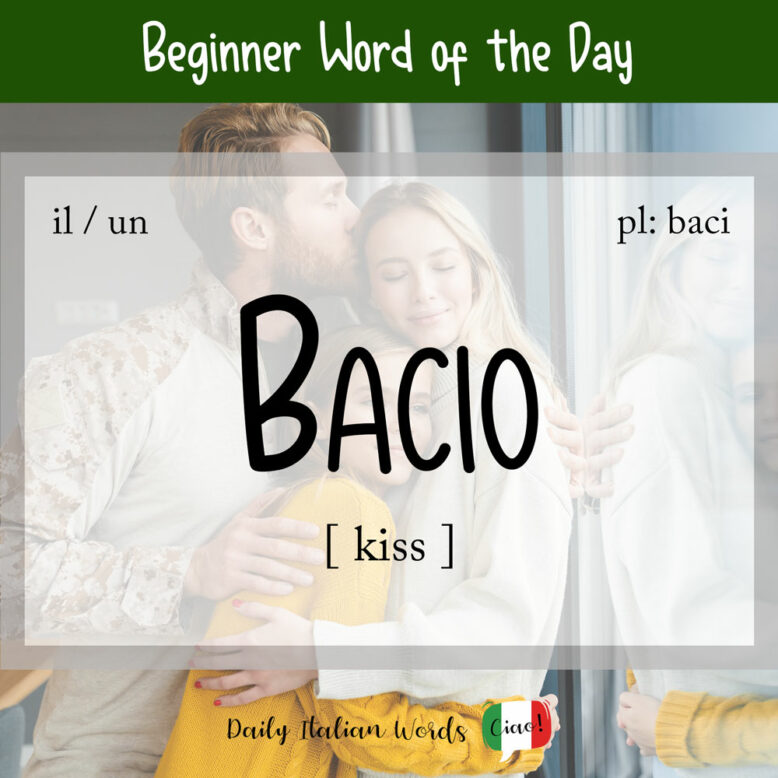Italian is known as one of the most romantic languages in the world, so it should come as no surprise that some of the first words people wish to learn are often linked to romance!
We already covered the word amore (love) and the expression ti amo (I love you) in previous articles, so today we’re going to talk about the word for kiss, which is bacio (plural: baci) in Italian.

Il primo bacio non si scorda mai.
You never forget your first kiss.
The word for a big kiss in Italian is bacione whereas a small kiss is a bacino.

There are many different types of kisses you can talk about, including:
- bacio alla francese = French kiss
- bacio della buonanotte = goodnight kiss
- un bacio sulle labbra = a kiss on the lips
- un bacio rubato = a stolen kiss
- un bacio a stampo = a (quick and firm) kiss on the lips
- un baciamano = a kiss on the hand
- un bacio eschimese = an Eskimo kiss
- un bacio a farfalla = a butterfly kiss
If you want to transform bacio into a verb, you can either say dare un bacio (give a kiss) or baciare (to kiss).
Gli sposi si sono baciati durante la cerimonia.
The married couple kissed during the ceremony.
Other verbs that can be used with bacio include:
- riempire (qualcuno) di baci = to cover (someone) in kisses
- mangiare (qualcuno) di baci = to eat someone up (with kisses)
- mandare un bacio = to blow a kiss
A very common way of signing off an informal email, text message or letter in Italian is to put un bacio (a kiss) or baci (kisses) at the end. It is used between lovers, friends and family members and may also be accompanied by un abbraccio (a hug) or abbracci (hugs).
Ciao Paola. Non vedo l’ora di vederti la prossima settimana. Baci!
Hi Paula. I can’t wait to see you next week. Kisses!
If you hear someone say al bacio, they aren’t referring to kisses but rather the state of something being top-notch, perfect or excellent.
Il gelato di questa gelateria è al bacio.
The gelateria’s ice cream is top-notch.
Sweets with the name “bacio”
The bacio di dama (or just bacio for short) is a special type of biscuit produced in the Piemonte region of Italy. Made of two melt-in-your-mouth hazelnut cookies sandwiched together with dark chocolate, they are said to resemble the lips of a lady.

Another well-known sweet is the Baci Perugina. The Italian version of chocolate kisses, they are filled a whole hazelnut, hazelnut grains and cocoa. Each chocolate is accompanied by a multilingual love note.
The Italian cheek kiss
In Italy, it is common to greet other people with two light kisses on either cheek, starting with the right side and then moving to the left. Unless you know the person well, it is best practice to avoid touching the other person’s cheek with your lips. This greeting is only used in informal situations and at social gatherings, so don’t try giving your boss or coworker a kiss – it will just lead to a very awkward situation!

Heather Broster is a graduate with honours in linguistics from the University of Western Ontario. She is an aspiring polyglot, proficient in English and Italian, as well as Japanese, Welsh, and French to varying degrees of fluency. Originally from Toronto, Heather has resided in various countries, notably Italy for a period of six years. Her primary focus lies in the fields of language acquisition, education, and bilingual instruction.


